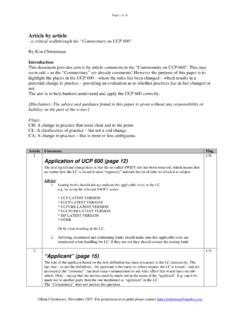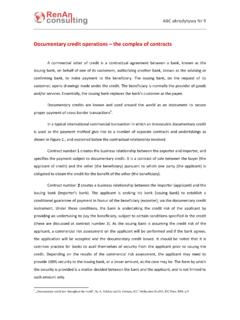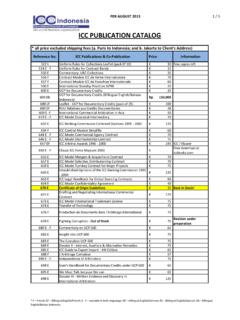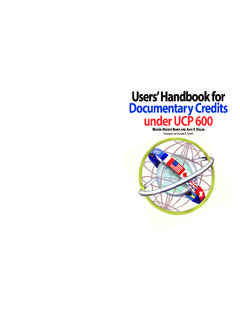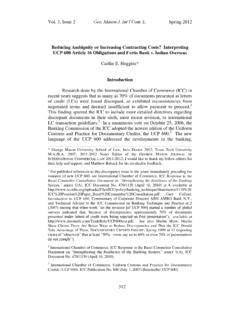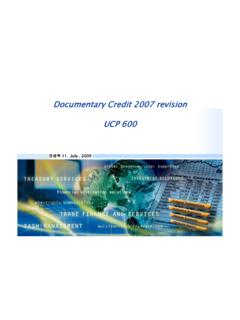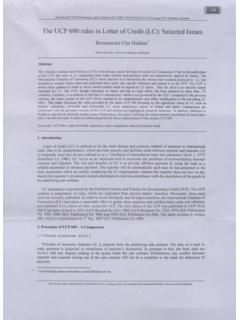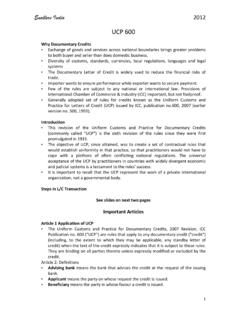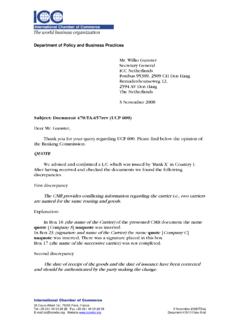Transcription of LLM e-thesis by Zhang Ruiqiao - McGill University
1 A Comparative Study of the Fraud Exception Rule of Letters of Credit: Proposed Amendments to the Chinese Credit System by Zhang Ruiqiao Faculty of Law McGill University , Montreal November 2009 A thesis submitted to McGill University in partial fulfillment of the requirements of the degree of Master of Laws ( ) Zhang Ruiqiao , 2008 iAbstract This thesis deals with the fraud exception rule of letters of credit, especially focusing on the proposed amendments in Chinese credit system based on a comparative study. In order to reasonably prevent fraud in letters of credit, and to protect the effectiveness and efficiency of credit system, this thesis firstly examines the premise, reasons and foundations of the fraud exception rule, and then analyses its legal philosophy, application criteria and judicial remedies. Finally, based on a comparative study of different domestic laws and the UCP rules, this thesis examines the existing defects and provides proposed amendments of the Chinese credit system in both procedure law and substantive law.
2 In developing this thesis, the author plans to employ comparative, critical, theoretical and prescriptive methodologies. iiResume Cette th se traite de la r gle de l'exception de fraude des lettres de cr dit, et se concentre plus particuli rement sur les amendements propos s dans le syst me de cr dit chinois sur base d'une tude comparative. Afin de pr venir la fraude dans les lettres de cr dit, et de prot ger l'efficacit du syst me de cr dit, cette th se examine tout d'abord les raisons de la cr ation de la r gle d'exception de fraude et analyse ensuite sa philosophie l gale, ses crit res d'application et les rem des judiciaires. Finalement, dans un troisi me temps, les d fauts existants sont analys s sur base d'une tude comparative de diff rentes lois domestiques et de r gles UCP et les amendements propos s dans le syst me de cr dit chinois la fois en loi proc durale et loi substantive sont d taill s.
3 L auteur pr voit d utiliser des m thodologies comparatives, critiques, th oriques et prescriptives pour aborder ces diff rentes questions. iiiAcknowledgement First, I would like to say thank you to my supervisor Professor De Mestral, for his detailed, patient, invaluable instructions. Without his outstanding help, the very completion of this thesis would not have been possible. I am also grateful to Professor C. Walsh, Professor Y. Emerich and Professor R. Macdonald, for finding the time in their very busy schedule to be the external examiners of my thesis. Special gratitude should go to Professor Van Praagh, who gives me continuous guidance and care in my study and life in Montreal and also gives me valuable support for my future study plan at McGill . I will never forget her help. My future study plan at McGill is also blessed by the engorgement and steadfast support by Professor Glen, Professor Blackett, Professor Huang and other professors.
4 A great thank you should also goes to all the professors for their wise lectures, insightful comments, patience and understanding for my LLM study. I learned a great number of knowledge from them. It is my fortune to have them as my professors in my life. Third, I should say thank you to Chunbao Liu, Alexandure, William and Fran ois Delobel who were ready to discuss ideas, provide feedback and contribute to the editing process of my thesis. I also truly appreciate all my wonderful friends from China, the law faculty and French class, who make my life in this strange country warm and colourful. I feel so lucky to have them. Last but not lease, I will always be indebted to my parents for their unreserved support throughout my whole life. ivTable of Contents Resume ..ii Acknowledgements ..iii Table of Contents ..iv Chapter One - Premise of the Fraud Exception I The Independence Principle and the Strict Compliance 1.
5 Law applicable to the Independence 2. Law applicable to the Strict Compliance II Reasons for the Adoption of the Fraud Exception 1. Challenges of the Independence 2. Correct Interpretation and Challenge of the Strict Compliance III Foundations of the Fraud Exception 1. Insistence upon the Independence 2. Insistence upon the Strict Compliance Chapter Two - A Review of the Fraud Exception I Law governing the Fraud Exception 1. Anglo-American Case 2. The 3. UCP II Legal Philosophy of the application of Fraud Exception v1. Good-Faith Theory in Civil 2. The Theory of Fraud in Common 3. The Theory of Public-Order Reservation in Conflict III Application of the Criteria of the Fraud Exception 1. Determination of the Existence of 2. Exceptions to the Fraud Exception IV Judicial Remedies of the Fraud Exception 1. Banks Rejection to Honor or 2. Injunction System in Anglo-American Chapter Three - The Fraud Exception Rule in I Chinese Application of the Fraud Exception 1.
6 Rules and Regulations of the Supreme People s 2. Rules and Regulations of the People s Bank of 3. Other Relevant II Existing Defects and Proposed Amendments of Chinese Procedure 1. The Subjects of the Fraud Exception 2. The Application Period of the Fraud Exception 3. Remedies of the Fraud Exception III Existing Defects and Proposed Amendments of Chinese Substantive 1. The Extent of 2. Exceptions of the Fraud Exception 3. The Ignorance of Third Parties 1 Introduction 1. The Background of Letter of Credit The letter of credit is one of the facilities used for the financing of international trade. It has served this function of the last 180 years. Nowadays, it has even evolved into an electronic letter of credit. The common variety of the letter of credit is the documentary credit,1 which is also called commercial credit, or letter of credit (L/C) or just credit in the ICC Uniform Customs and Practice for Documentary Credits 6002 (hereinafter called ucp 600 ).
7 The normal documentary credit used as a payment mechanism is the subject of this thesis. The two other forms of the broad meaning letter of credit, which might be referred to in this thesis where relevant and applicable, are the acceptance credit and the standby credit, but the focus of this thesis is on the Letter of Credit as a payment mechanism. Different from the documentary credit, the standby credit is not necessarily related to underlying contracts of sale or shipments of goods, thus it is not necessarily applicable in payment situation and does not require examination of shipping documents and files. The main function of the standby credit is to prevent one or both parties from attempting to breach a contract due to changes in market or other reasons. The standby credit is 1 Ellinger Letter of Credit , Horn, Norbert & Clive M.
8 Schmitthoff, eds. The Transactional Law of International Commercial Transactions, (The Hague: Kluwer Law and Taxation Publishers, 1982), p242. 2 ucp 600 , 1933, ICC 600, (2007). 2gaining increasing use as performance bonds in the construction field, and fidelity bonds and collateral security in financing operations. For example, in oil transportation, especially in short voyages such as the transportation between European countries, goods might be shipped to the port of discharge in one day while the bills of lading are not yet issued in the loading port. In this situation, it is more practical and convenient for the parties of sale contract to use cash as the payment instrument rather than documentary credits. However, in order to make the seller be more secure and confident to do business, the buyer could still issue a standby letter of credit as a back-up. From which it can be seen that the standby letter of credit is not necessarily applicable in payment situations.
9 Although the standby letter of credit has an important function as a guarantee, it is by no means equal to a bank letter of guarantee. Because the standby credit requires proof of non-performance of the underlying transaction, rather than solely requiring documentary compliance by the beneficiary. Furthermore, the proof of fraud is more difficult in standby credits than in documentary credits. In other words, it is really hard to prove that the beneficiary s breach of contract is a fraud. Just as Judge Kerr stated in Harbottle (Mercantile) Ltd. v. National Westminster Bank: this is not a case of an established fraud at all. The seller may well be right in contending that buyers have no contractual right to payment of any part, let alone the whole, of the guarantee..But all these issues turn on contractual disputes. They are a 3long way from fraud, let alone established fraud. 3 (1) Definition of Letter of Credit According to the Osborn s Concise Law dictionary, the letter of credit (herein after adopting the narrow meaning of the documentary credit in this thesis) is defined as an authority by one person to another to draw cheques ( ) or bills of exchange ( ) (with or without a limit as to amount) upon him, with an undertaking to honor the drafts on presentation.
10 An ordinary letter of credit contains the name of the person by whom the drafts are to be negotiated or cashed: when it does not do so, it is called an open letter of credit. 4 For most documentary credits, the following documents are required: first, a bill of lading, issued by a common carrier to the seller, which serves as a receipt acknowledging that goods have been shipped; second, a commercial invoice, which prepared by the seller, describes the items sold along with the cost of such commercial items; third, an inspection certificate indicating that the goods have passed through a quality inspection before being transported; forth, a government-issued or other legal document that shows that the goods are ready for export ( , export license), and meet the regulatory requirements of the importing country ( , foreign exchange license); and fifth, an insurance certificate showing that the beneficiary obtained insurance 3 Harbottle (Mercantile) Ltd.

